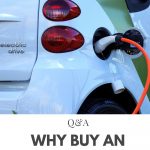How Many Watts Does An Electric Car Use Per Mile?
Topic: How Many Watts Does An Electric Car Use Per Mile?
How Many Watts Does An Electric Car Use Per Mile?
Like diesel or petrol engine vehicles, the energy consumption of electric vehicles’ energy consumption depends on the model and manufacturer. We don’t talk about “litres per 100 kilometres”; instead, we talk about ” kilowatt-hours per one hundred kilometres”.
It’s difficult to estimate the exact amount of energy consumed by electric vehicles since many factors must be considered. But, the cost of electricity per 100 kilometres is significantly less than EUR 4. (or maybe EUR 3 for certain vehicles).
What is the cost of the pump?
The majority of electric vehicles can travel 100 km with just 15 kWh. Their low energy consumption them extremely energy-intensive. Although diesel or petrol engines convert only 35 per cent of the energy into power, the electric car can achieve 90 % and even more.
However, it’s difficult to figure out the price to “fill the battery with electricity”,, i.e. to charge the battery in the following ways:
- the cost per kWh varies dependent on the provider chosen
- The use for the car is based on its range, the capacity of its battery, and the kind of the vehicle’s driving.
It is calculated that the price of electric power for a hundred kilometres is less than EUR four (or maybe EUR 3 for some cars). Therefore, it is much lower than the cost of an internally combustion engine for the exact distance.
People also ask:
How much energy does an electric car use per mile?
So I had to do some research, and here it is: the average kWh of an electric car per 100 miles (kWh / 100 miles) is 34.6. This equates to 0.346 kWh per mile. In other words, on average, electric cars consume 34.6 kWh to drive 100 miles and 0.346 kWh to drive 1 mile.
How many watts does an electric car use?
Modern electric cars typically have batteries with a capacity of 24 to 100 kWh (kilowatt hours). It is a measure of the energy stored in batteries. One kWh means one thousand watts for one hour. Therefore, a 24 kWh battery contains enough energy to deliver 24,000 watts for one hour.
How many watts does a Tesla use per mile?
Data from our 2019 Tesla Model 3 Long Range Dual Motor long-term test car highlights the difference between the fuel consumption and efficiency of electric vehicles. Model 3 used the most power in January 2021, a cold month in which temperatures averaged 30 degrees F. It used 358 watt-hours to travel every mile.
How many watts of power does a Tesla use?
Since electrical devices use the same amount of electricity they receive, a completely empty Tesla Model S needs 387692307.692w in total to fully charge. If you type “How much does a Tesla cost” you will get this immediate answer: “Overnight electricity costs are calculated at 10 pence per kWh.
Is 300 watts a lot of power?
What can you get to work with a 300 watt solar panel? A 300-watt panel that receives 8 hours of sunlight a day will produce almost 2.5 kilowatt-hours a day. If we multiply that by 365 days a year, we get a solar production of about 900 kilowatt hours per year.
How many amps does an electric car need?
Most electric vehicles can draw around 32 amps, which adds around 25 miles of range per charging hour. Therefore, a 32 amp charging station is a good option for many vehicles. You can also increase your speed or prepare for your next vehicle with a faster 50-amp charger that can add around 37 miles of range in an hour.
Should I charge my electric car every night?
In general, you don’t need to charge your electric car every night. This is not necessary in most cases. The practice of recharging an electric vehicle every night can shorten the life of a car battery.
Is 1500 watts a lot?
Most electric heaters use 1500 watts, but some are a little lower or a little higher. Since 1000 watts equals 1 kilowatt, that means your oven uses 1.5 kilowatts of power. However, your electricity bill is measured in kilowatt-hours, which is the amount of energy used to run a 1 kilowatt device for one hour.
Is 500 watts a lot for a speaker?
First, the speakers have no power. A watt is a unit of power, and unless your speakers have built-in power amplifiers, they don’t. It’s certainly not safe to say that a 500-watt speaker will be louder than a 200-watt one (although it often is).
Is 50 kWh a day a lot?
But since most houses are quite comparable in size and we can’t control the weather, 50kWh per day is a good amount to use, although maybe a bit high for some houses.
Do electric cars lose charge when parked?
Electric vehicles lose their charge when parked, although this is minimal, it can build up over time. Green Car Reports suggests that you charge the battery to at least 80% before parking the car. It will also disable some unnecessary systems, which would otherwise slowly drain your battery.
What age does car insurance go down for females?
Auto insurance rates for women drop dramatically by age 21, from about 27% from $ 1,114 to $ 878, which is both lower than what men pay for insurance automobile at the same age.
Recommended Article:
What Is Hybrid Electric Vehicle?
How Long Does It Take To Charge A Tesla?
Electric Van That Could Use Solar Panels
Tesla Autopilot with Convenience Features





